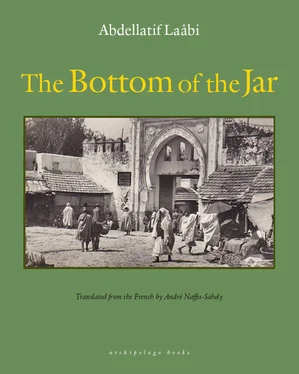This time, Namouss went on his own, his eyes still heavy with sleep. The days of sleeping late were through, no more leisurely breakfasts of café au lait, pancakes coated in fresh butter and soaked in honey, or doughnuts, still steaming hot, that Driss had sent over when he knew everyone in the house was up and “beginning to boil.” Ghita, not a natural-born lark, nonetheless got up at the earliest opportunity and helped Namouss get washed and dressed. For his lunch, she filled half a loaf of bread with preserved meat.
“Here you are,” she would say, “something to fill your belly. And now off you go, scram!”
Imparting neither advice nor affection. In certain situations, Ghita is not very effusive. She, who has given birth to eleven children, has seen a few things in her day. As soon as one baby was born, she was pregnant all over again.
“I have become just like a cow,” she used to say over and over. “Oh dear Mother, why couldn’t I have been born a boy? At least men, thanks to their members, don’t have to worry about such things.”
Once at school, Namouss witnessed something unexpected. The students who had gotten there before him had lined up in the playground. One by one, they were called forward by a man who was carrying some kind of utensil on his back. Tied to the utensil was a little tube with a showerhead attached to its end. The children were required to undress and keep their eyes fixed on their underwear. Those wearing djellabas were very upset because they were usually naked underneath. They therefore had to expose their private parts for the whole world to see. The man put his utensil into action and sprayed each student from head to toe with a white powder whose smell began to make even those in the back rows cough and sneeze. This powder was actually DDT, though Namouss was none the wiser. He must have thought that it was only flour, maybe a little stale, and was surprised by such customs. As a result, when his turn came, he decided to laugh and surrender himself to the hazing.
After that rite of passage, the students were arranged back into groups as a prelude to the major event: the division into classes. Mr. Fournier, preceded by his reputation for strictness, came into view. The man was a giant, but a bony, skinny one whose clothes hung loosely from him. There were many stories about him, notably that he’d been badly wounded in a faraway war, that they’d had to cut off his buttocks and replace them with prosthetics made of rubber. That was the root of his legendary obsession for punishing students by giving them a kick up the backside. Rarely dealt out, this sort of punishment, christened “kickintheass,” was especially dreaded. Tradition in the home, as well as at Qur’an school, favored beatings imparted with rods carved from the quince tree, floggings by way of large leather belts produced by local craftsmen, or even the falaqa , where the soles are whipped while the feet are bound by an instrument that closely resembles a garrote. Aside from its strangeness, the kick up the backside is singularly intolerable due to a variety of social conventions. Contrary to female buttocks — the wellspring of all lust — male buttocks are, you might say, the repository and fortress of one’s honor. One must not go anywhere near them. At least in theory. Now in practice, it’s a whole other matter. .
Mr. Fournier went through the roll call systematically, mispronouncing everyone’s name. Despite the eccentric enunciation, Namouss at one point realized his name was being called out. He suddenly felt a great swell of pride. It was the first time anyone had spoken his full name out loud. It felt like a second baptism.
The class was established. Standing in front of a line traced with chalk, the students got into pairs by holding each other’s hand. Namouss gave his to Hat Roho (literally “he who has laid down his soul”), a boy from his neighborhood. Among so many strangers, he was happy to find a familiar face. The famous bell rang and the teachers came to look for their pupils. The one heading right for Namouss’s row was none other than Mr. Benaïssa, and this filled him with disquiet. Had the teacher forgotten Namouss’s indiscretion? Would he recognize him? Would he welcome him into his classroom after all? The nervousness lasted all the way into the classroom, right up to the point when the teacher bade them sit. Apparently Mr. Benaïssa hadn’t suspected a thing. Namouss deduced he had been saved by the powdery mask that still covered his face and hair. Disguised by that makeup, Namouss’s confidence came back, and he resolved to rise to the challenge, to see this new experience — into which, for better or worse, he had been initiated — through to the end. But this was only the first of many surprises involving Mr. Benaïssa. Sporting a big smile, he began by articulating a word (in fact two) that Namouss immediately recognized: “ Sbah l-kheir ” (good morning).
“ Sbah l-kheir ,” the class echoed back, all except for Namouss, who was convinced there had been a misunderstanding. What on earth is going on here? he asked himself. Aren’t we going to be learning Freensh ? If we’re going to speak the same language we use at home, then going to school isn’t worth my time.
Mr. Benaïssa soon steadied the helm, however, and repeated the morning greeting in Arabic, then followed suit with its equivalent in the other language: “ Bonjour !”
Taken aback, the students repeated after him, some better than others. In the midst of this cacophony, one could distinguish some bounjours , some bojors , and even some boujours . Having chewed over the word seven times in his mouth, only Namouss cried out like a man possessed: “ Bonjour !”
The mysteries of languages and the unforeseeable ways in which they determine who speaks what all over the world!
“ Bonjour !” Namouss yelled again at the top of his voice, at one stroke having the strange impression he was swimming against the tide. This not only earned him a number of filthy looks from his classmates but also incurred the teacher’s scrutiny.
Having spotted the boy genius, Mr. Benaïssa pointed his ruler at Namouss and called for everyone’s attention.
“Yes, you, repeat,” he said to Namouss.
“ Bohjour !” Namouss repeated, a frog in his throat.
“Louder!” Mr. Benaïssa ordered.
“ Bonjour !”
This time, the word rang out as clear as crystal.
“Good,” Mr. Benaïssa said, “you’ve earned yourself a gold star.”
Namouss could hardly contain himself. He teetered between an immense sense of pride and the feeling that he’d betrayed his classmates. He kept his head down for the remainder of the lesson, though his ears stayed wide open. He contented himself with quietly repeating the words whose correct pronunciation Mr. Benaïssa was taking great pains to impart to his pupils: Bonjour Ali, bonjour Fatima. Bonjour monsieur, bonjour madame. Bonjour maître, bonjour monsieur le Directeur .
HAVING COMPLETED THE exercise, Mr. Benaïssa decided to immerse his audience into a world of magic by taking a twinkling metal flute out of its case and beginning to play it. Namouss had only seen reed flutes before and so the instrument’s physical aspects, as well as the music it was spreading, produced the effect of a wonderful fairy tale in him. Yet this did not lead to the discovery of other places or the characters of myths and legends; rather, what fascinated him the most was that an instrument so seemingly simple could unleash such a wide range of notes, going far beyond the handful of boring nursery rhymes he and his friends used to hum to the tune of a simple la la lalala:
Oh wily little grasshopper
Читать дальше












